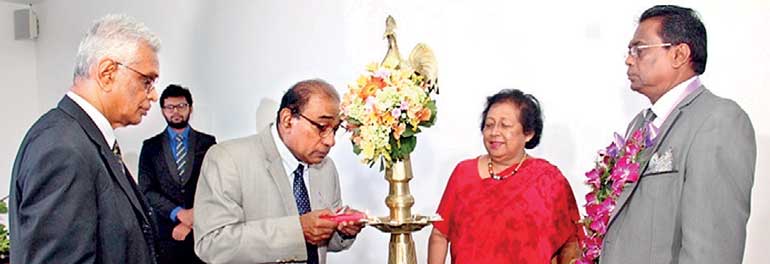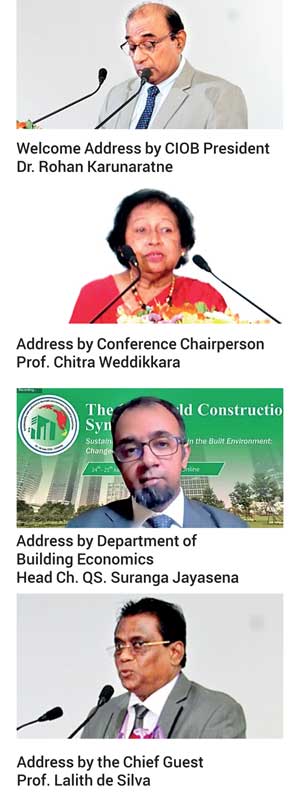Tuesday Feb 17, 2026
Tuesday Feb 17, 2026
Tuesday, 9 August 2022 03:26 - - {{hitsCtrl.values.hits}}


CIOB and UoM Team (from left): Mahanama Jayamana, Sudath Amarasinghe, Prof. Yasangika Sandanayake, Kalana Alwis, Dr. Rohan Karunaratane, Prof. Lalith De Silva, Prof. Chitra Wedikkara, Saliya Kaluarachchi, Dr. Anuradha Waidyasekara and Ruwan De Silva

Symposium Support Team
The 10th World Construction Symposium 2022 on ‘Sustainability and Resilience in the Built Environment: Changed Perspectives’ was successfully held recently.
This symposium, indexed by SCOPUS since 2019, provides a special forum for researchers and practitioners in the area of sustainable construction worldwide to share their knowledge, experience and research findings.
The Ceylon Institute of Builders (CIOB) and Building Economics and Management Research Unit (BEMRU) of the Department of Building Economics, University of Moratuwa jointly organised the 10th World Construction Symposium with associate partners: Western Sydney University, Australia; The University of Newcastle, Australia; Colombo School of Construction Technology (CSCT), Sri Lanka; and Built Environment Project and Asset Management (BEPAM): Journal, published by Emerald Group Publishing.
Further, BEPAM Best Paper Award and BEPAM Highly Commended Paper Awards were sponsored by Built Environment Project and Asset Management (BEPAM) and CIOB Best paper Award and CEOM Highly Commended Paper Award were arranged by Ceylon Institute of Builders (CIOB).
This year’s symposium marks the 10th milestone of this symposium series, which has been held annually since 2012. Throughout the past decade, we are happy to see WCS grow in success and gaining recognition from academics and industry participants from around the world, providing a multi-stakeholder platform for those involved in the built environment and construction industry related research and practice to come together to share their knowledge and experiences.
Amidst the political and economic crisis prevailing in Sri Lanka that has critically impacted many industries including construction, this year’s symposium was organised around the theme “Sustainability and resilience in the built environment: Changed perspectives”. The crisis meant that this was the second year in a row that we organised this symposium as a mainly digital event.
Symposium was inaugurated with the presence of the Guest of Honour University of Moratuwa Faculty of Architecture former Dean Prof. Lalith de Silva. International Council for Research and Innovation in Building and Construction (CIB) Chief Executive Don Ward was the first keynote speaker of this event.
He delivered a keynote on “Innovation and Global Trends in Our Sector”. The second keynote was presented by University of Moratuwa Faculty of Architecture former Dean Prof. Lalith de Silva. His speech was on the topic “Revitalising the Debt Structure Strategy of the National Economy Using the Resilience of the Built Environment”.
Altogether, 76 papers were selected for publication following a double-blind review process. It is worthwhile to note that the authors of the selected papers were from a range of different countries including Australia, India, Malaysia, New Zealand, Nigeria, Sri Lanka, Turkey, United Kingdom and USA.
The papers covered a wide spectrum of areas such as sustainable urban development and infrastructure, knowledge management and lessons learned, cost management in construction, innovative procurement approaches, building information modelling, contract administration and dispute resolution, health, safety and wellbeing, pandemic resilient construction, waste management, energy and retrofitting, green building systems, disaster resilient built environments, enhancing construction performance, innovative technologies for sustainability, circular built environment, and sustainable operation and management of facilities.
Many researchers, industry practitioners and students took part in this symposium sharing ideas in the area of sustainability and resilience in the built environment. The diversity of participants stimulated a rich debate of the agenda items.
After the 16 parallel sessions for paper presentations, a panel discussion was organised on the theme of “Rebooting to a Resilient Construction Industry - Bouncing Back Better from Multiple Crises”.
The panel discussion was moderated by IQSSL Immediate Past President Ch. QS Lalith Rathnayake and the panellists consisted of following eminent academics and industry professionals.
The symposium concluded with announcing of the following award winners.
In conclusion, the 10th World Construction Symposium 2022 can be seen as another highly successful event for the organisers. Even amidst the constraints imposed by the pandemic and socio-economic-political crisis, the symposium saw a good participation by both local and international academics and industry experts who presented papers addressing a range of sustainability issues within the construction industry.
The Symposium was sponsored by the following organisations:
Speaking on the successful conclusion of the 10th World Construction Symposium, Ceylon Institute of Builders President Dr. Rohan Karunaratne and the Organising Committee Co-Chairs Sagara Gunawardena and Kalana Alwis mentioned: “We feel proud of the fact that we have been able to host the conference for the 10th consecutive year. Today this symposium has become a looked forward to event among the academics and researchers in the construction industry in Sri Lanka.
“Organising this edition of the conference has been particularly challenging due to the current economic crisis that the country is going through. But, thanks to the untiring effort by the Organising Committee, especially the Department of Building Economics of the University of Moratuwa, the symposium has become a grant success and was able to maintain the high standard of technical and academic excellence that is expected from an international symposium.”
Symposium Chairperson Prof. Chitra Wedikkara mentioned that she was extremely pleased to have been associated in organising successive World Construction Symposiums since 2012. She further said that during the last 10 years, the World Construction Symposium has grown in stature to be one of the premier construction symposiums in the country and has gone a long way in addressing the pressing issues that the industry faces with regard to sustainable construction.
Moratuwa University Department of Building Economics Head Prof. Yasangika Sandanayake stated: “We are delighted to be a joint organiser of this prestigious annual event. We are hugely impressed by the diversity and high standard of submissions that we received for this year’s symposium.
“We are thankful to our joint organiser, Ceylon Institute of Builders, all associate partners, keynote speakers, members of panel discussion, Scientific Committee members, authors who presented papers, session chairs, participants, members of the Organising Committee, Symposium secretariat and all those who contributed to make this event a grant success. Our special thanks go to the Editor-in-Chief of BEPAM Journal, Emerald Group Publishing and their team for their invaluable contribution to the symposium.”